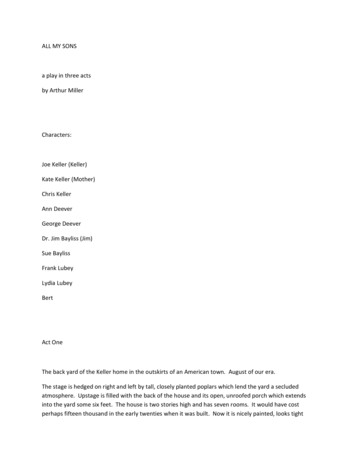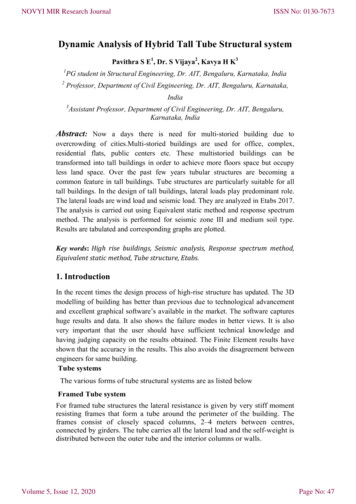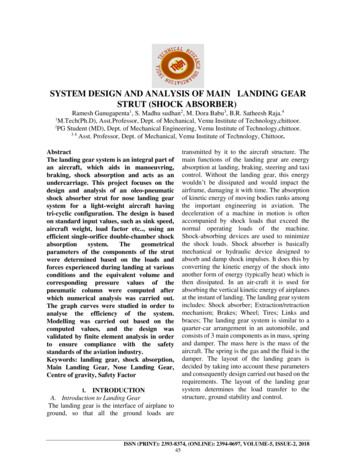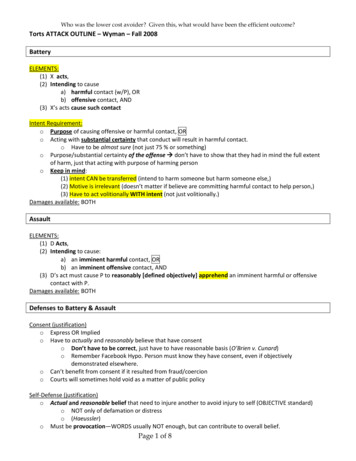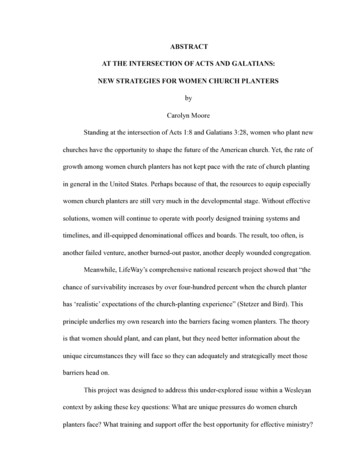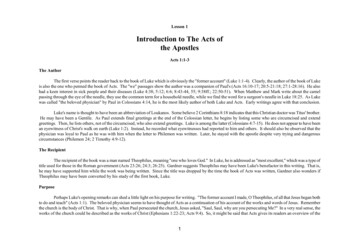
Transcription
Lesson 1Introduction to The Acts ofthe ApostlesActs 1:1-3The AuthorThe first verse points the reader back to the book of Luke which is obviously the "former account" (Luke 1:1-4). Clearly, the author of the book of Lukeis also the one who penned the book of Acts. The "we" passages show the author was a companion of Paul's (Acts 16:10-17; 20:5-21:18; 27:1-28:16). He alsohad a keen interest in sick people and their diseases (Luke 4:38; 5:12; 6:6; 8:43-44, 55; 9:38ff.; 22:50-51). When Matthew and Mark write about the camelpassing through the eye of the needle, they use the common term for a household needle, while we find the word for a surgeon's needle in Luke 18:25. As Lukewas called "the beloved physician" by Paul in Colossians 4:14, he is the most likely author of both Luke and Acts. Early writings agree with that conclusion.Luke's name is thought to have been an abbreviation of Loukanos. Some believe 2 Corinthians 8:18 indicates that this Christian doctor was Titus' brother.He may have been a Gentile. As Paul extends final greetings at the end of the Colossian letter, he begins by listing some who are circumcised and extendgreetings. Then, he lists others, not of the circumcised, who also extend greetings. Luke is among the latter (Colossians 4:7-15). He does not appear to have beenan eyewitness of Christ's walk on earth (Luke 1:2). Instead, he recorded what eyewitnesses had reported to him and others. It should also be observed that thephysician was loyal to Paul as he was with him when the letter to Philemon was written. Later, he stayed with the apostle despite very trying and dangerouscircumstances (Philemon 24; 2 Timothy 4:9-12).The RecipientThe recipient of the book was a man named Theophilus, meaning "one who loves God." In Luke, he is addressed as "most excellent," which was a type oftitle used for those in the Roman government (Acts 23:26; 24:3; 26:25). Gardner suggests Theophilus may have been Luke's benefactor in this writing. That is,he may have supported him while the work was being written. Since the title was dropped by the time the book of Acts was written, Gardner also wonders ifTheophilus may have been converted by his study of the first book, Luke.PurposePerhaps Luke's opening remarks can shed a little light on his purpose for writing. "The former account I made, O Theophilus, of all that Jesus began bothto do and teach" (Acts 1:1). The beloved physician seems to have thought of Acts as a continuation of his account of the works and words of Jesus. Rememberthe church is the body of Christ. That is why, when Paul persecuted the church, Jesus asked, "Saul, Saul, why are you persecuting Me?" In a very real sense, theworks of the church could be described as the works of Christ (Ephesians 1:22-23; Acts 9:4). So, it might be said that Acts gives its readers an overview of the1
workings of Jesus for the thirty years following his resurrection.The Lord told Zacchaeus his reason for coming to earth when he said, "For the Son of Man has come to seek and to save that which was lost" (Luke19:10). Thus, McGarvey's thinking about Luke's purpose for writing is easily understood. He says, "Much the greater part of Acts may be resolved into a detailedhistory of cases of conversion, and of unsuccessful attempts at the conversion of sinners. If we extract from it all cases of this kind, with the facts and incidentspreparatory to each and immediately consequent upon it, we will have exhausted almost the entire contents of the narrative."Setting the StageLuke tells his reader that his first book set forth those things Jesus did and taught. It seems significant that he would mention actions first, then words.Unlike those of us who have sinned, Jesus' actions were consistent with his preaching. In fact, they underscored his teachings. Those actions and words wereconcluded on the day our Lord ascended into the heavens to be seated on the right hand of the Father. In his instructions following the resurrection, the stage wasset for the remainder of the book of Acts (1:1).While on earth, Jesus took the form of a man and relied on the Holy Spirit to empower him to work miracles. Such resulted in the warning Jesus gavethose who would attribute his power to work miracles to the devil. After all, he really worked miracles by the power of the Holy Spirit (Mark 3:20-30). Paul eventold the Roman brethren he was raised by the power of the Spirit (Romans 1:4). Luke tells us Jesus also gave commands through the Holy Spirit (1:2).The apostles were the ones who received those commands of the Christ. After all, they had seen him alive after his death and burial, as could be provenby over five hundred witnesses (1 Corinthians 15:1-11). For forty days, the resurrected King taught his chosen apostles important truths concerning the kingdomof God, or church (1:3). From the time Jesus ascended, he spoke to his apostles through the promised Spirit (John 16:13). So, in the truest sense, the title for thisbook could be "The Acts of Jesus As Seen in the Workings of the Spirit in the Lives of the Apostles."2
Discussion Questions1. Who do you think wrote the book of Acts? Why?2. Who was the recipient of the book? What type of man do you think he was?3. What do you think was the author's purpose in writing Acts? Why?4. In what sense is it appropriate to say the book of Acts is a continuation of the history of the things Jesus did and taught?5. Discuss the united efforts of Christ and the Holy Spirit in scripture.3
Lesson 2Waiting for the KingdomActs 1:4-26The Promise of the Holy SpiritDuring the days following the resurrection, Jesus appeared to his apostles on several different occasions. On the one mentioned in Acts 1:4, the Lord mayhave eaten with the apostles, as the margin of the American Standard Version suggests. Certainly, we know Jesus did eat with his disciples following theresurrection. Luke records one incident in Luke 24:36-43. Peter told those assembled in the house of Cornelius that Jesus ate and drank with certain witnessesfollowing being raised from the dead.However, what really matters is that he instructed them to remain in Jerusalem until the Father's promise, about which he had told them, came. Thepromise he refers to is the coming of the Comforter, or Helper (John 14:15-18; 16:5-15). All the apostles had been baptized by John in water at their repentance,but Jesus told them before many days passed they would be baptized with the Holy Spirit (Acts 1:5; Mark 1:4).Questions Concerning the KingdomConcepts developed in childhood are sometimes difficult to change. Such was certainly the case with the apostles' thinking about the kingdom Jesuswould establish. They believed it would be an earthly kingdom that would conquer all of its enemies. So, "they asked Him saying, 'Lord, will You at this timerestore the kingdom to Israel?'" The Lord told them only the Father knows the precise timing of events he has planned, which would include the establishment ofthe kingdom and the end of time (Acts 1:6-7; Matthew 24:36).While they could not know God's timetable, it was important for the apostles to know they were to receive power when the Holy Spirit came upon them.Then, they were to take their witness into all the world, radiating out in ever widening circles from Jerusalem (Acts 1:8).Jesus Ascends Into HeavenHaving issued these final instructions, Jesus began to bless the apostles. At that moment, Jesus was taken up into a cloud. This is the fulfillment of theLord's own prediction when he asked his disciples, "What then if you should see the Son of Man ascend where He was before?" (John 6:62; see also Mark 14:62).Before he came to earth, Jesus was with the Father in Heaven. The apostles saw him begin his ascent back to the throne.One can almost imagine the apostles standing, mouths agape, looking up into the clouds where they had last seen the Savior. While they were looking,Luke tells us two men in white clothing stood by and told them Jesus would come again in the same way they had seen him go. Matthew describes the appearanceof the angel who rolled away the stone by saying, "His countenance was like lightning, and his clothing as white as snow." Since it seems the two men in shininggarments in Luke 24:4 are called angels in John 20:12, it is very likely the two "men" who Luke says stood by the apostles are angels who appeared in the form of4
men (Acts 1:9-11; Luke 24:50-51). The statements of the angels in reference to the Lord's return clearly indicate he will come literally, visibly and in his glorifiedbody.Praying in JerusalemIn full accord with the Lord's instructions, those who had seen Jesus ascend went into the city of Jerusalem and assembled in an upper room. In hisprevious writing to Theophilus, Luke had said their return to the city was a joyful one. He also reported that they "were continually in the temple praising andblessing God" (Luke 24:52-53). Clearly, the time of sorrow following the crucifixion was over and the apostles realized the events they had witnessed werereason for rejoicing. The eleven, Mary, the Lord's mother, his half-brothers and some other unidentified disciples were constantly found in prayer as they awaitedthe promise of the Holy Spirit (Acts 1:12-14).Matthias Chosen to Take Judas' OfficeSometime during that period of waiting, Peter addressed a group of about 120 disciples in reference to the office formerly held by Judas. He had to bereplaced because he had been numbered with them and had a part in the ministry the Lord had given to the apostles.The entire assembly would have been acquainted with the facts surrounding Judas' death and the purchase of the "Field of Blood." Having realized whathe had done, Judas threw the thirty pieces of silver down in the temple and went out and hanged himself. From what Luke further reports, we conclude either thebranch he used to hang himself on or the rope itself broke and Judas' body fell and burst open. The chief priests did not feel blood money should be placed in thetreasury, so they purchased a field in which to bury strangers (Acts 1:15-19; Matthew 27:3-10).Quoting from Psalm 69:25 and 109:8, Peter reported that the Holy Spirit, through David, had said the habitation of Judas, perhaps as Ash suggestsreferring to the Field of Blood, would become desolate and another would be chosen to take his office. So, Peter set forth certain qualifications necessary for oneto be chosen to take the office of an apostle. He had to have been with the Lord from the time of the baptism of John to the ascension. He would especially needto be able to stand forth as a witness of the resurrection (Acts 1:20-22).Two men were selected who met those qualifications, Barsabas, surnamed Justus, and Matthias. Then, they addressed a prayer to the One who knowshearts, thus acknowledging their own inability to see into the inward thoughts of others. Their prayer was also a means of expressing complete dependance uponGod for making a correct decision. They asked that the Ruler of the universe guide the selection process so that the right man would be chosen. "And they casttheir lots, and the lot fell on Matthias. And he was numbered with the eleven apostles" (Acts 1:23-26).5
Discussion Questions1. Explain the importance of the apostles being baptized with the Holy Spirit.2. Discuss the establishment and nature of the Lord's kingdom.3. How should the promise of the Lord's return effect you day to day?4. Discuss the importance of prayer to the Lord and how such affected the apostles.5. Briefly relate what happened to Judas. Why do you think it was necessary for another to be chosen to take his office?6
Lesson 3The Baptism Of theHoly SpiritActs 2:1-13The Baptism of the Holy SpiritJohn the Baptist foretold that Jesus would baptize with the Holy Spirit. God told John the one who would administer that baptism was the one "Uponwhom you see the Spirit descending, and remaining on Him". No mere apostle could baptize someone with the Holy Spirit. It had to be the Son of God. Ofcourse, that same Son must one day baptize some with the fire of judgment (Matthew 3:10-12; John 1:31-34; Revelation 20:14-15; 21:8).It should be remembered that baptism involves an immersion or overwhelming. Paul helps one understand the meaning of baptism in Colossians 2:12."Buried with Him in baptism, in which you also were raised with Him through faith in the working of God, who raised Him from the dead." The apostle to theGentiles viewed baptism as a burial.The mother of James and John asked for her sons to be seated on Jesus' right hand. He asked if they were able to be baptized as he would be (Matthew20:20-23). The context makes it plain he was speaking of a baptism of suffering. As Nichols says, "It was an overwhelming of suffering, and a submersion, as itwere in what is figuratively referred to as an 'element' of suffering" (1 Peter 3:18). Similarly, when the word baptism is used in connection with the Holy Spirit, it"carries with it the idea (although figuratively expressed) of the amount of the Holy Spirit given and received in the case" (Nichols, p. 89).PentecostThe first feast of the Jewish year was Passover. Passover was always on the evening of the fourteenth day of the month of Abib, which was the firstmonth (Exodus 12:2; 13:4). The second feast followed fifty days later. In the New Testament it is called Pentecost (Acts 2:1; 20:16; 1 Corinthians 16:8). "Thisfeast has three names in the Old Testament; they are 'feast of weeks' (Ex. 34:22; Deut. 16:10), 'feast of harvest' (Ex. 23:16), and 'day of first-fruits' (Num. 28:26),"according to Boles.He went on to explain that "it came at the end of the reaping season, when all the wheat and barley had been cut and gathered. It was held at the centralsanctuary. (Deut. 16:11.) The people were expected to assemble at the place of the altar and hold their celebration." Pentecost was a happy celebration of God'sgreat provision. Freewill offerings were made with a special emphasis placed upon doing good for the Levites, strangers, orphans and widows (Deuteronomy16:10-14).7
The Promise of the FatherRemember, just before his ascension to the throne in heaven, Jesus told his apostles to wait in Jerusalem "for the Promise of the Father, 'which,' He said,'you have heard from Me; for John truly baptized with water, but you shall be baptized with the Holy Spirit not many days from now.'" He also promised theywould receive power when the Holy Spirit came upon them. In Luke 24:49, Jesus said, "Behold, I send the Promise of My Father upon you; but tarry in the city ofJerusalem until you are endued with power from on high." In contrast to the baptism of the great commission, which was a command, the baptism of the HolySpirit was a promise.The ones who first received the promise were to go into all the world preaching the gospel (Acts 1:1-8; compare Luke 24:46- 49). Since a pronoun alwaysrefers to its antecedent, one must go back all the way to Acts 1:2 to discover the "you" of verse 8 refers to the apostles. The Holy Spirit played a significant role inthe fulfillment of the command to go into all the world. As the Lord said, "But the Helper, the Holy Spirit, whom the Father will send in My name, He will teachyou all things, and bring to your remembrance all things that I said to you" (John 14:26).The first physical evidence the Promise had come was a sound like a rushing, mighty wind which filled the house in which the apostles were sitting. Weknow the "they" of 2:1 refers to the apostles because 1:26 tells us Matthias was numbered with the eleven. As a second evidence, divided tongues which lookedlike fire appeared to them and sat on each of them. Finally, each spoke in a language he had never studied. In these ways, the Holy Spirit's presence was madeknown (Acts 2:1-4).The Audience ReactionMoses instructed that all males be present for the feast of Pentecost, so it is no surprise that Luke would say, "Now there were dwelling in Jerusalem Jews,devout men, from every nation under heaven." Luke listed at least fifteen separate nations represented on the day of Pentecost (Acts 2:5, 9-11). "The list ofgeographical names shows the diversity of the people to whom the apostles spoke, the provinces and locations mentioned lying in all directions from Jerusalemand representing a cross-section of the languages spoken in the entire Roman empire" (Coffman).The coming of the Holy Spirit was effectively confirmed by the witnesses who came together because of the sound like a rushing, mighty wind and saidthey heard every man in the language in which he was born. The audience did not have to be told something unusual was happening. The apostles did not have totell everyone that they had received, or gotten, as some say, the Spirit. Those from the fifteen nations mentioned by Luke heard them speaking in their owntongues, or languages. They also saw that which Christ poured out. Their surprise at what they heard and saw moved them to seek possible explanations. Somemerely wondered at the meaning of the occurrences, while others said the apostles were drunk (Acts 2:6-7, 11-13, 33).8
Discussion Questions1. In your own words, explain what the baptism of the Holy Spirit is, who administers it and what impact it has on those receiving it.2. Describe the significance of the day of Pentecost to the Jews.3. Why do you think the coming of the Holy Spirit was so necessary for the apostles?4. What evidence of the Spirit's coming caused the Jews to assemble on Pentecost?5. Describe the miracle which occurred and the reaction of the audience.9
Lesson 4Proclaiming Christ As KingActs 2:14-36Spoken By JoelPeter immediately set out to end the wild speculations as to the cause of the apostles being able to speak in languages they had never studied. First, heobserved that it was just 9 a.m. Coffman wrote, "On a festival like Pentecost, no Jew ever ate or drank anything till after 9 A.M." Certainly, then, they could notbe drunk. Second, he told the assembled crowd that the things they had seen and heard were the fulfillment of the prophecy of Joel 2:28-32. The Jews understoodJoel's prophecy, coupled with those of Isaiah (2:2-4) and Micah (4:1-5), regarding the last days to be a specific reference to the coming of the Messiah. Johndescribed the time of his writing as "the last hour," the writer of Hebrews knew he and his readers were in "these last days" and Peter said the redemptive blood ofJesus "was manifest in these last times for you" (1 John 2:18; Hebrews 1:2; 1 Peter 1:20).Peter plainly says the pouring out of the Spirit upon the apostles was the fulfillment of the prophecy of Joel. Peter thereby notified his hearers that theywere living in the last days. While not all of Joel's prophecy was fulfilled on the day of Pentecost, such is not disturbing because the writing was concerning aperiod of days rather than a single day. Later, the Spirit would be poured out on the Gentiles, thereby including all flesh, and some daughters would prophesy(Acts 10:44-47; 21:9). Additionally, it can even now truthfully be said that, "whoever calls on the name of the Lord shall be saved" (Acts 2:14-21; Romans 10:917). Calling on the name of the Lord entails one asking the Lord by his authority to set one free from his sins, an act which can only be accomplished by yieldingto his will as it was expressed in his commandments (Matthew 7:21; Mark 16:16; Acts 22:16; 1 Peter 3:21).They Crucified God's Approved ManNo one could successfully deny that Jesus had worked miracles because they had been done in plain view. Those miracles should have inspired awe(wonder) in the hearts of those who saw them and been a clear sign that Jesus was God's spokesman and, in fact, His Son (John 5:36; 10:25; 20:30-31; Hebrews2:4). Peter, recognizing the Lord's greatness, was moved to feel his own unworthiness in the presence of the Lord (Luke 5:1-11). Some clearly recognized thesedisplays of God's power for what they were and believed in the Son. The nobleman whose son was at the point of death and some of the Jews who had gone tocomfort Mary were in this category (John 4:46-54; 11:45). Others explained the miracles away by attributing them to the power of Satan, criticizing and seekingan opportunity to kill the Lord (Matthew 12:22-30; Mark 3:1-6; John 11:1-57). Oddly enough, they recognized Jesus' works as mighty but looked beyond that factto the potential result of their losing power!Imagine the shock of those who ultimately succeeded in crucifying the One by whom they felt threatened when Peter said God had actually knownbeforehand the actions they would take! Their shock could only have been compounded by the realization that God allowed them to crucify Jesus and then raisedhim from the dead (Acts 2:22-24)! Yet, a careful study of God's writings, which they claimed to so admire, would have revealed both God's foreknowledge andhis intent to let them crucify the Messiah and then raise him so he could see his children (Genesis 3:15; Isaiah 53:6-12).10
David's Prophecies Concerning ChristPeter quoted from Psalm 16:8-11, saying that in it David was speaking concerning the Christ. Jesus died and his body was lain in the tomb of Joseph ofArimathea, but his spirit, or soul, went to Paradise in Hades (Luke 23:43-56; 16:19-31). However, our Lord trusted the Father to reunite his soul with hisresurrected body in a powerful display intended to leave no doubt as to the true identity of Jesus of Nazareth. Referring to Psalm 16:8-11, Coffman says, "It isabsolutely certain that this passage from the OT prophesies a resurrection of someone, for it is only by a resurrection that one could descend into the grave (Hades)and not see corruption" (Acts 2:25-28).That David did not speak of himself is clearly seen in the fact that his body saw corruption and was still in its grave in the very city of Jerusalem wherePeter spoke. Peter argued that David knew when he wrote of God's Holy One he was not speaking of himself but, through the voice of prophecy, was speaking ofthe promised King who would arise from among his offspring. Peter and the eleven who stood with him were witnesses of the very resurrection David hadforetold. They had seen Jesus in his resurrected body (Acts 2:29-32)!Peter could testify Jesus was now seated on his throne in heaven because the Holy Spirit had come. During his earthly ministry, Jesus had told hisapostles, "Nevertheless I tell you the truth. It is to your advantage that I go away; for if I do not go away, the Helper will not come to you; but if I depart, I willsend Him to you" (John 16:5-15, esp. 7). The apostle to the Jews used a further quotation from David to prove Jesus Christ was to be Lord over David and rulefrom his throne, not on earth, but in heaven (Acts 2:33-35; Psalm 110:1).Jesus Is Master and KingThe unmistakable conclusion of all the previous arguments is that Jesus of Nazareth was made Master and King by the Eternal Father (Acts 2:36). The very onethey had crucified had now been placed by God in the position of authority. Anyone wishing to come to the Father would have to yield to Him!The evidence presented by Peter on Pentecost was irrefutable. He had opened up two separate prophecies of David before their eyes. He had presentedthe testimony of reliable witnesses who had seen the resurrected Lord. He had called his listeners' attention to the unique events of the day, which had to haveoriginated from heaven itself through the workings of God's Spirit. If Jesus' tomb still contained Jesus' remains, surely the Jews would have thrown them down infront of Peter and asserted that his body was corrupting just as David's had. The fact that they remained silent is strong evidence of the Lordship of Jesus!11
Discussion Questions1. Explain the significance of Joel 2:28-32 to the events of Pentecost.2. How does one call on the name of the Lord in order to find salvation?3. Describe some of the evidences of Christ's Sonship which some Jews had seen and ignored?4. Explain how David's prophesies relate to Peter's argument that God had made Jesus King.5. Why do you believe Jesus is the Christ, the Son of God?12
Lesson 5Those Added to the ChurchActs 2:37-47"Cut to the Heart"It is hard to imagine just how stunned some in Peter's audience must have been. The man who they recognized as a Galilean and likely viewed asuneducated had just presented a compelling argument in which he indicted them as the murderers of the Son of God. His presentation was so powerful because ofthe "Comforter," or "Helper," or "Advocate," which are the various ways to interpret the Greek word Paraclete. Bales used several authors to show the wordliterally means attorney for the defense in a court of law. The Holy Spirit used undeniable truths to show Jesus was the Son of God despite the Jews accusations tothe contrary.Jesus described the Spirit's work in John 16:5-15. He said, in part, "And when He has come, He will convict the world of sin, and of righteousness, and ofjudgment: of sin, because they do not believe in Me; of righteousness, because I go to My Father and you see Me no more; of judgment, because the ruler of thisworld is judged." The evidence presented by Peter on Pentecost, as delivered to him by the Comforter, truly convicted many in his audience. In fact, Lukereports, "Now when they heard this, they were cut to the heart, and said to Peter and the rest of the apostles, 'Men and brethren, what shall we do?'"The Keys to the KingdomIn Matthew 16:19, Jesus promised Peter, "And I will give you the keys of the kingdom of heaven, and whatever you bind on earth will be bound inheaven, and whatever you loose on earth will be loosed in heaven." On the cross, Jesus asked his Father to forgive those who crucified him in ignorance. Boththese passages find the beginning of their fulfillment in Acts 2:38. The Holy Spirit, through Peter, had already identified those in the assembled multitude as thosewho had used lawless hands to crucify God's Son. When they asked what they must do to be saved, Peter told them to, "Repent, and let every one of you bebaptized in the name of Jesus Christ for the remission of sins; and you shall receive the gift of the Holy Spirit."Repenting involves a change of will, or mind (Matthew 21:28-32). Baptism is a dipping, plunging, immersing or overwhelming. Today, we would saybaptism is a burial (Colossians 2:12). Both repentance and baptism were to be done in the name of Jesus. Bales says, "Of course, Peter was not telling them inActs 2:38 what he would say when he baptized them, but rather what they were to do in being baptized, i.e. they were to be baptized resting on His name,submitting to His authority, depending on Him as Savior and Lord."The purpose of repentance and baptism under the authority of Jesus was to receive the promised result of the remission of sins. Luke recorded Peter'swords using the Greek tense which set forth what he said as an urgent command. His urgency stemmed from the fact that such actions were required for them toreceive the salvation they had sought. In 1 Peter 3:21, the apostle explained that baptism is the means of one's calling on God to cleanse him based upon thedeath, burial and resurrection of Jesus.13
The Gift of the Holy SpiritA further benefit of submitting to Christ's authority in repentance and baptism is the reception of the gift of the Holy Spirit. Peter explained that thepromise of the gift was available to the Jews, their children and the Gentiles, or those who were afar off. Of course, the promise is only for those who the Lordcalls. However, the only limitation on God's call stems from man's willingness, or lack thereof, to respond to God's call since it clearly extends to all who willwork righteousness (Acts 10:34-35). The Spirit is ready to give life to any who will submit to God and then make that individual's body his temple (Romans 8:911; 1 Corinthians 6:19-20).Peter pleaded with his listeners to save themselves from the wicked generation in which they lived. Those who obediently received the words of Peterwere receiving the words of Christ, since the Lord said, "Most assuredly, I say to you, he who receives whomever I send receives Me; and he who receives Mereceives Him who sent Me" (John 13:20; Luke 10:16). Because they received the Lord's words, about three thousand were added together in the kingdom (Acts2:38-41).The Early Church At WorkThose who were added together gave constant attention to the apostles' teaching because, as we have just seen, it was the teaching of Christ. RememberJesus told his followers to teach those who had been baptized to "observe all things that I have commanded you" (Matthew 28:18-20). In adhering to hisinstructions, the apostles taught them about "fellowship," which is from the Greek word koinonia. Thayer says it means, "association, community, communion,joint participation, intercourse. used of the intimate bond of fellowship which unites Christians." They enjoyed each other's company and gladly shared theirmaterial possessions when anyone had need (Romans 15:26; 2 Corinthians 8:4; 9:13).The apostles also taught them to give continuing attention to the breaking of bread. This is an obvious reference to the Lord's supper, since there would benothing remarkable about new Christians continuing to eat. Then, the twelve guided the new believers in prayer. Coffman writes, "Whereas in Judaism, prayerswere offered at stated times of the day, the Christians offered prayers at any and all times, and in any and all places." Such holy living, combined with themiracles worked by the apostles, caused the surrounding community to be in awe (Acts 2:42-45).Daily Occurrences In the Early ChurchThose first converts were in the temple daily, likely for Bible study and worship. They also spent time together on a daily basis, as "breaking bread fromhouse to house" would seem to indicate. Their daily partaking of food was do
1 Lesson 1 Introduction to The Acts of the Apostles Acts 1:1-3 The Author The first verse points the reader back to the book of





